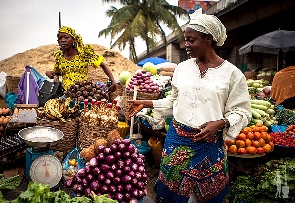In recent times, Africa has had to deal with the threat of food insecurity. A 2021 report by the United Nations estimated the impact of food insecurity to have culminated in over 281.6 million malnourished Africans. The persistent threat of food insecurity is largely influenced by poor agricultural development, infrastructure, climate crisis, and supply constraints. With the increasing food insecurity, there has never been a more critical time for Africa to address its food challenges. Africa's food system will benefit from increased investment, enabling policies, infrastructure construction, climate-proof solutions, and the continental free trade area. The rising level of food insecurity can be addressed through increased investment in Agricultural research and development. According to the 2021 Food and Agriculture Organization report, African countries allocated less than 10 percent of their national budgets to the agricultural sector. By increasing investment in the agricultural sector through higher budget allocation, Africa can improve its agricultural productivity. Africa's food system can be strengthened with the implementation and monitoring of enabling policies and regulations. Although there are existing agricultural policies in Africa, there is no evidence-based data to indicate their implementation. Policies that center around leveraging technology hold enormous potential for tackling Africa's food insecurity challenges. Such agricultural policies can be implemented through new legislation, executive decrees, investment projects, agricultural programs, and voluntary collaboration by the private sector. Policy implementation, monitoring, and analysis can accelerate Africa's agricultural transformation. Climate change's impact on agricultural output can be restored through infrastructure construction. Extreme weather conditions have resulted in Africa's large yield gap. A large yield gap signifies low crop output and hence low agricultural productivity. The consequence of this mitigates the well-being of rural communities and farmers who rely largely on agriculture for their source of livelihood. Through the construction of infrastructures such as drought irrigation and flood drainage facilities, agricultural output would be sustained. Climate-proof solutions can also serve to mitigate the prevailing climate crisis for improved agricultural productivity. Green technologies and climate-resilient crops are viable solutions. In this instance, African scientists can develop new strains of drought, temperature, and higher-yield crops through national investment. This method is already in use in the United States and China, especially for grains and vegetables. Africa can replicate such efficient measures to safeguard agriculture. Across the continent, supply constraints pose a significant threat to achieving food security. Poor market access results in food loss and waste. The supply constraints also constitute a loss of agricultural produce, highly impacting the economy. A report estimated that over US $4 billion is lost per year in the agricultural sector. The estimated value is enough to feed at least 48 million people. Modeling free trade would increase intra-African agricultural trade by reducing trade costs. Implementing the African Continental Free Trade Area (AfCFTA) is a viable way of modeling free trade. The AfCFTA addresses trade in goods through non-tariff barriers which eliminates tariffs on 90 percent of goods. With free trade, African countries can focus on agricultural goods where they have a comparative advantage. Such focus creates and strengthens regional food value culminating in economic growth and development. Furthermore, enhanced market access is beneficial in establishing social nets for poor farming families and safeguarding their livelihood. Implementation of the AfCFTA through the lifting of trade barriers is a viable solution to address food insecurity. Freedom from hunger is a fundamental human right. The highest attainable standard of health is achievable only with food security. Therefore, Africa must strive to rise above food insecurity and protect the basic rights of its citizens. By stepping up enabling policies, resources, and productive investments for agricultural growth and development, Africa can move beyond its food insecurity issues.
Opinions of Monday, 17 October 2022
Columnist: Chiamaka Adinnu
How to mitigate rising food insecurity in Africa
Opinions














